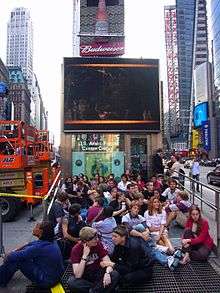Soulforce

Soulforce is an American social justice and civil rights organization that supports acceptance of lesbian, gay, bisexual, transgender, and queer (LGBTQ) people through dialogue and creative forms of nonviolent direct action. Soulforce is inspired by the principles of relentless nonviolent resistance as taught and practiced by Mahatma Gandhi and Martin Luther King, Jr.
It was founded in 1998 by Mel White, who was a ghostwriter for Jerry Falwell, Billy Graham, Pat Robertson, and others until he came out as a gay man.[1][2] The organization's Executive Director is currently Haven Herrin.
Equality Ride
Since 2006, Soulforce has supported a project called the Equality Ride. Led by young adults, it targets Christian colleges.[3] In 2007 it was divided into two different trips (eastern and western), each leg visiting 15-20 different colleges. Other rides were launched in 2008 and 2010. A fifth Equality Ride is planned for the spring of 2012.
Right to Serve Campaign
In 2006 Soulforce organized the Right to Serve Campaign, the first nationally organized youth effort to bring attention to the "Don't ask, don't tell" policy of the United States Armed Forces. Youth in 30 cities across the country were recruited to organize events in which openly lesbian, gay and bisexual youth attempted to enlist in the United States Armed Forces while stating their sexual orientation. Headed by Jacob Reitan and Haven Harrin, it took place in 30 cities from late summer and fall of 2006.[4] It attracted coverage in both local and national media. Reitan said: "The don't ask don't tell policy couldn't be any more clearly government-sanctioned discrimination. The Right to Serve Campaign is a way for us to show to the American people how this discrimination works."[4]
In May, in Roseville, a suburb of Minneapolis, two men and a woman tried to enlist in the Minnesota National Guard. One application was rejected immediately and the others put on hold.[5] On August 30, in Madison, Wisconsin, an Army recruiter turned away three men, one a college graduate and the others college students.[6] One of them said: "We're not here as a publicity stunt. I want to serve alongside my fellow Americans. That's why we're here."[7] Two men turned away by recruiters in Chicago on September 12, 2006, returned the next day and staged a sit-in. They were briefly arrested but not charged.[6] A University of Maryland sophomore was turned away when she tried to enlist on September 26.[8] Other events, some including arrests, occurred in New York; Austin, Texas; and Greensboro, North Carolina.[9] In New York City, the recruitment center was closed, but the Right To Serve protesters staged a 7-hour sit-in that resulted in no arrests.[4]
The Campaign was endorsed by the Servicemembers Legal Defense Network (SLDN), which stated: "We applaud the young men and women from Right To Serve who seek to join the proud tradition of military service. The Right To Serve campaign challenges the federal government to end its prohibition on open and honest service by gay Americans, at a time when America can ill afford to turn away even one bright, capable recruit in the fight against terrorism."[10] In December 2006, SLDN also named the Campaign as number five on its list of the Top-Ten "Don't Ask Don't Tell" stories of 2006.[11]
Elaine Donnelly, president of the Center for Military Readiness, stated in September 2006: "I think the people involved here do not have the best interests of the military at heart. They never have. They are promoting an agenda to normalize homosexuality in America using the military as a battering ram to promote that broader agenda." She said that "pro-homosexual activists...are creating media events all over the country and even internationally."[12]
See also
References
- ↑ NPR: Steve Inskeep, "Religion, Politics a Potent Mix for Jerry Falwell," June 30, 2006, accessed February 29, 2012
- ↑ Charisma Now: Michelle Van Loon, "'Equality Ride' Targets Christian Colleges," May 31, 2006, accessed March 9, 2012
- ↑ http://www.soulforce.org/equalityride
- 1 2 3 MTV News: "Equality Ride: The Right To Serve", accessed March 9, 2012
- ↑ Washington Post: "Testing the Policy on Gays," June 11, 2006, accessed March 9, 2012
- 1 2 New York Times: Lizette Alvarez, "Gay Groups Renew Drive Against 'Don't Ask, Don't Tell'," September 14, 2006, accessed March 9, 2012
- ↑ ABC News: Eric Hornig, "'Don't Ask, Don't Tell' Ripe for Change?," August 31, 2006, accessed March 9, 2012
- ↑ CNN: "Paula Zahn Now," September 26, 200-6, accessed March 9, 2012
- ↑ North Carolina Public Radio: WUNC and National Public Radio, Greensboro, NC (.mp3 audio news file), accessed March 9, 2012
- ↑ Right to Serve Official Website
- ↑ The Frontlines: SLDN Blog: "#5 The Right to Serve", December 11, 2006, accessed March 9, 2012
- ↑ ChristiansUnite.com: Chad Groening , "'Coordinated' Campaign Targets Military Ban on Homosexuals," September 21, 2006, accessed February 25, 2012
External links
- Soulforce — official website